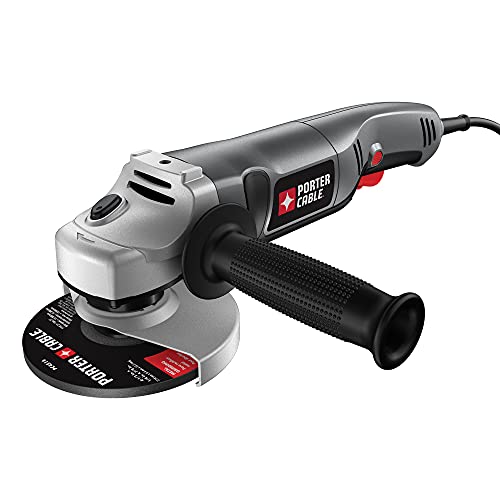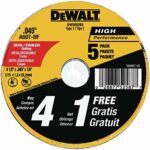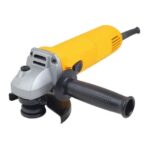
Cutting or grinding something that seems not accessible to the grinder means you need to use a different tool. Another genius friend thought a grinder is a great tool to sand the wooden floor of his front porch. “My son in law, was helping his friend replace an old fence with a colorbond fence. Having seen me doing this a few times, he felt full of confidence. Borrowed my 9” grinder to cut the old fence post off … For some unknown reason he thought that cutting from right to left was the way to go so proceeded to reposition the left hand handle on the top and was cutting with right hand on the dead man switch and left hand on the vertical handle cutting from right to left the post at ground level.
115mm flap discs will fit a 125mm grinder, they use the same centres up to 230mm. I use an assortment of 115mm and 125mm grinders with different grinding and cutting discs and a flexible backing pad with fibre discs for linishing, lasts ages and is kinder to the metal than grinding disc and cheaper than flap discs.
That is, 115 mm and 180 mm angle grinder can have a value of 1 kW. But the weight of the angle grinder and its power are directly proportional. So when grinding with an abrasive thick wheel Ø115 mm, the angle grinder used must have a power of at least 1 kW. That is, the larger the diameter / weight of the circles used and the higher the load, the more powerful the angle grinder should be. It is better to purchase the 125 mm version with a power of about 1 kW, buy 150 mm from 1 kW, choose a model of 180 mm of at least 1.5 kW, and take a 230 mm tool more powerful than 2 kW. Thus, if you plan one angle grinder for all occasions in life, it is preferable to choose a model for 125 mm interchangeable equipment.
For similar reason the boiler maker was using a 7″ angle grinder rather than a 9″ angle grinder. I personally have 2 x 4″ angle grinders for light duty works and a 5″ angle grinder for heavier work plus a 9″ grinder for big work [Bosch]. So you see my brethren, oils ain,t oils and neither are angle grinder units,so in your never ceasing search for the true quality angle grinder you must be diligent and apply the question of quality about each and every feature.
Below is a specification comparison between a Metabo 4 1/2″ Angle Grinder and Metabo 5″ Angle Grinder. “In a comparison test, we used a Metabo 4 1/2″ Angle Grinder against a Metabo 5″ Angle Grinder with the same bond Speedgrit 1.6mm cutting discs. Measurement Metric 4 1/2″ Angle Grinder 5” Angle Grinder In house cutting test results cutting 150mm x 8mm mild steel flat and 1.6mm discs 3 cuts 6 cuts 100% greater consumable life Average time per cut 67secs 55 secs 21.8% faster cutting speed.
Of the different types of powered grinders available, the angle grinder is probably the most common and widely used. Angle grinders fitted with the appropriate disc can be used to grind and cut metal or stone. The smaller angle grinders operate at higher speeds – 4½ inch grinder will typically operate at 10000 rpm whereas a large 9 inch grinder will rotate at only 6500 rpm.
Here’s our guide to selecting the right grinder for your job. Used for metalworking and finishing work, the disc of a straight grinder is mounted in the opposite way to that of an angle grinder. Whether you are grinding, cutting, deburring or sanding, no material is able to stand up to a grinder.
100mm vs 125mm angle grinder Related Question:
What size angle grinder is the best?
It all boils down to what you’re trying to accomplish.” As for size, most DIYers are best off with an angle grinder that uses 4.5-inch or 5-inch discs, although if you handle very large or tough projects, you’ll appreciate the extra size of a 7-inch angle grinder.
How deep will a 125mm angle grinder cut?
All in all, 125mm angle grinders are extremely versatile tools despite their limited cutting depth of just 38 mm. While 115mm angle grinders offer a maximum cutting depth of only 30 mm, they are precise, easy to handle and lighter than larger versions.
Is a bigger angle grinder better?
Disc diameter – angle grinders with larger diameters take bigger discs that make deeper cuts. Wattage – higher wattage gives more power to cut through denser materials. Speed – multiple speeds give more control for precise work.
What size angle grinder blade do I need?
The size of the disc should have a direct bearing on your choice of angle grinder. The two most common disc sizes are 4.5” (115mm) and 9” (230mm). Grinders with larger discs are particularly well suited to heavy-duty applications, whereas those with smaller discs are ideal for finer work.
What is arbor size on angle grinder?
“The “standard” spindle (sometimes called the “arbor”) thread these days on a angle grinder in the US is 5/8-11 (5/8″ diameter and 11 threads per inch).
How deep can a 4.5 angle grinder cut?
A 4.5 angle grinder has a blade that is 4.5-inches in diameter. This means the blade extends 2.25-inches for the center in each direction. As a result, it is not physically able to cut through 4 inch concrete. Select a larger grinder when a deep cuts are necessary, such as a 9-inch grinder.
Can I use bigger disc on angle grinder?
Fitting a 14 inch (356 mm) cut-off disc to a 9 inch (230 mm) angle grinder will increase the edge speed excessively to at least 120 m/s (430 kmph). The photograph below shows an angle grinder with the wrong size cutting disc fitted and the guard removed.
How deep will a 9 angle grinder cut?
For example a 4″ grinder can go as deep as an inch and a 9″ grinder can go as deep as 3″ depending on the angle/ position. This grinder is very powerful, a bit heavy but that’s to be expected for a unit this size.
What is a 9 inch grinder used for?
Angle grinders are versatile tools that can grind metal and cut tile, stucco and pavers, rout out mortar, plus they can sand, polish and sharpen. Learn to use an angle grinder to cut tile, mortar and pavers; make quick work of rust and loose paint removal; sharpen blades and cut or grind steel.
How do I choose an angle grinder disc?
depends on the type, shape and thickness of the steel that needs to be cut. For standard everyday jobs on either stainless or mild steel using an angle grinder, choose a 1mm or 1.6mm thickness in your disc. For projects that involve thin metal such as sheet metal, choose a 1.0mm or 0.8mm thinner cutting disc.
What is a 100 angle grinder?
4′ (100mm) angle grinders, as the name suggests, accept grinding discs up to 100mm in size. These grinders are relatively small in size, and are suitable for smaller jobs. The size of disc that the grinder can accept dictates the depth of cut that the grinder can achieve.
What size blade fits a 9 inch grinder?
A (nine) 9 inch grinder is 230mm.
Is a brushless angle grinder better?
Are Brushless Grinders Better? To put it bluntly, yes! Brushless motors utilized in cordless power tools are way more efficient than brushed motors and require zero maintenance.
What size is arbor on 4 inch grinder?
Almost every 4 1/2″ angle grinders in the US have a 5/8″ spindle diameter size. However, on 4 1/2″ abrasive discs, the actual diameter of the arbor hole is 7/8″.
What is an arbor size?
The arbor is the shaft that holds the blade. On all American stationary saws that use a 10″ blade, the arbor is 5/8″ in diameter where the blade is attached.

